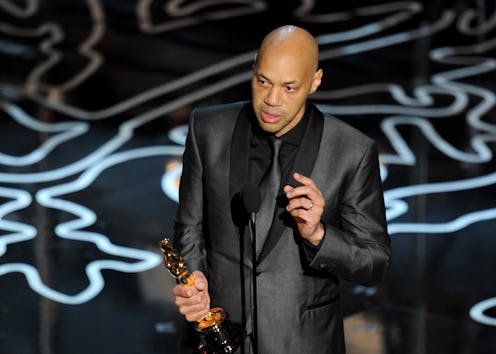Entertainment
The '12 Years' Feud You Didn't Know About
It was a triumphant night for 12 Years A Slave, with Lupita Nyong'o taking home the statue for Best Supporting Actress and the film taking home Best Picture. But is there something less joyous going on behind the scenes? Because viewers might have noticed a bit of tension between 12 Years director Steve McQueen and John Ridley, the film's screenwriter, at Sunday night's Oscars ceremony. So... what's up with that?
The simple answer is that no one in the public has any details on the supposed rift quite yet. What we do know is what a lot of people picked up on it throughout the night — most notably in the moments following Ridley's win for Best Adapted Screenplay. As he ascended to the stage the camera cut to McQueen, whose applause and facial expression have been interpreted as stiff. That, coupled with the fact that Ridley walked right by McQueen during his handshakes and hugs with other 12 Years A Slave contributors, and ta-da! You've got a classic Hollywood feud.
Fuel was thrown on the fire when Ridley didn't mention McQueen in his acceptance speech — he spent his time talking about Solomon Northrup's original strife and the legacy that came out of it, which was beautiful, but it rings a few bells when anyone wins and Oscar and doesn't thank the director of the film.
He also didn't bring up McQueen in his win at the Independent Spirit Awards, opting to thank the film's entire cast and crew for making the movie happening but not mentioning the director himself*.
So what's going on here? What is this tension? There's a lot of speculation that it's centered around a screenplay credit — Deadline founder Nikki Finke said so, after all, so that's the leading theory being echoed around. If McQueen had been credited as a screenwriter on the project he'd have also won an Oscar when Ridley did, and since he didn't, you can bet some egos were bruised between the credited and the uncredited.Issues with screenplay credits are not new to Ridley's relationships with Oscar-nominated directors: A similar feud boiled between him and American Hustle director David. O Russell, that time over credit for the 1999 satirical film Three Kings , which Russell directed. As Ridley told Entertainment Weekly back then:
This is a guy who every step of the way has tried to grab credit. I never heard a word while he was shooting the movie. Never saw any of the script changes. And then finally, a year later, I get a copy of the script, and my name isn't even on it. It's 'by David O. Russell.' My name is nowhere.
Given that, it seems entirely possible that this time around Ridley wasn't quite as patient when it came to directors taking credit. This could all, of course, be in our collective minds — some desire by the audience to dredge up conflict in a night that went pretty much as predicted. But the visual evidence is compelling, as is the history. Of course, regardless of who got credit for what, it's hard to deny that McQueen and Ridley created something beautiful, devastating, and enduring with their adaptation of 12 Years A Slave. They both won big that night. Then again, it's also hard to deny how intriguing a behind-the-scenes feud can get to the people trying to peek in.
Just get a hold of that shade:
*Update: Upon rewatch, it has come to my attention that this statement is incorrect: Ridley and McQueen shared a moment during the speech, Ridley calling working with McQueen "fun" and thanking the director for his work. Scale back the perceived drama accordingly.
